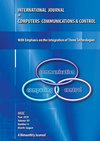Energy Saving Routing Algorithm for Wireless Sensor Networks Based on Minimum Spanning Hyper Tree
IF 1.9
4区 计算机科学
Q3 AUTOMATION & CONTROL SYSTEMS
International Journal of Computers Communications & Control
Pub Date : 2023-10-30
DOI:10.15837/ijccc.2023.6.5706
引用次数: 0
Abstract
With the rapid development of wireless sensor networks (WSNs), designing energy-efficient routing protocols has become essential to prolong network lifetime. This paper proposes a minimum spanning tree-based energy-saving routing algorithm for WSNs. First, sensor nodes are clustered using the LEACH protocol and minimum spanning trees are constructed within clusters and between cluster heads. The spanning tree edge weights are optimized considering transmission energy, residual energy, and energy consumption rate. This avoids channel competition and improves transmission efficiency. An energy-saving routing model is then built whereby deep reinforcement learning (DRL) agents calculate paths optimizing the energy utilization rate. The DRL reward function integrates network performance metrics like energy consumption, delay, and packet loss. Experiments show the proposed approach leads to 10-15W lower average switch energy consumption compared to existing methods. The throughput is high since overloaded shortest paths are avoided. The average path length is close to shortest path algorithms while maintaining energy efficiency. In summary, the proposed minimum spanning tree-based routing algorithm successfully achieves energy-saving goals for WSNs while guaranteeing network performance. It provides an efficient and adaptive routing solution for resource-constrained WSNs.基于最小生成超树的无线传感器网络节能路由算法
随着无线传感器网络的快速发展,设计节能的路由协议已成为延长网络寿命的关键。提出了一种基于最小生成树的无线传感器网络节能路由算法。首先,利用LEACH协议对传感器节点进行聚类,并在簇内和簇头之间构造最小生成树。考虑传输能量、剩余能量和能量消耗率,优化生成树边权值。这样避免了信道竞争,提高了传输效率。然后建立节能路由模型,通过深度强化学习(DRL)智能体计算优化能源利用率的路径。DRL奖励功能集成了能耗、时延、丢包等网络性能指标。实验表明,与现有方法相比,该方法的平均开关能耗降低了10-15W。由于避免了过载的最短路径,因此吞吐量很高。平均路径长度接近最短路径算法,同时保持能源效率。综上所述,基于最小生成树的路由算法在保证网络性能的同时,成功地实现了wsn的节能目标。它为资源受限的无线传感器网络提供了一种高效的自适应路由解决方案。
本文章由计算机程序翻译,如有差异,请以英文原文为准。
求助全文
约1分钟内获得全文
求助全文
来源期刊
CiteScore
5.10
自引率
7.40%
发文量
55
审稿时长
6-12 weeks
期刊介绍:
International Journal of Computers Communications & Control is directed to the international communities of scientific researchers in computers, communications and control, from the universities, research units and industry. To differentiate from other similar journals, the editorial policy of IJCCC encourages the submission of original scientific papers that focus on the integration of the 3 "C" (Computing, Communications, Control).
In particular, the following topics are expected to be addressed by authors:
(1) Integrated solutions in computer-based control and communications;
(2) Computational intelligence methods & Soft computing (with particular emphasis on fuzzy logic-based methods, computing with words, ANN, evolutionary computing, collective/swarm intelligence);
(3) Advanced decision support systems (with particular emphasis on the usage of combined solvers and/or web technologies).

 求助内容:
求助内容: 应助结果提醒方式:
应助结果提醒方式:


